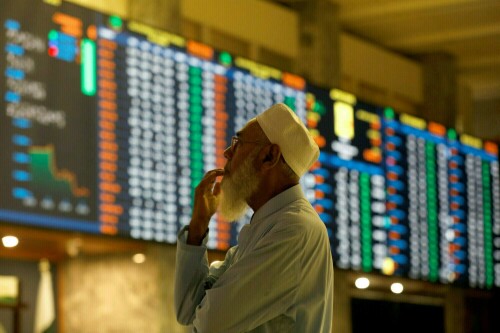PSX KSE-100 Index Surges Past 120,000 Mark
Trading at the Pakistan Stock Exchange (PSX) saw a promising start this Monday, as the benchmark KSE-100 Index exceeded the 120,000 threshold in the initial minutes of trading.
As of 9:30am, the KSE-100 Index was recorded at 120,001.07, reflecting an increase of 351.93 points, which is equivalent to a 0.29% rise.
IMF Revises Pakistan’s GDP Growth Forecast
In a recent report, the International Monetary Fund (IMF) has adjusted Pakistan’s GDP growth forecast downward to 2.6% for the current fiscal year 2024-25. This is a decrease from the 3.2% projection made in October, citing weaker economic activity in the first half of the year and widespread global economic uncertainties.
Previous Week’s Market Performance
The PSX demonstrated a robust recovery during the past week, achieving its most significant week-on-week gain in five years. This surge followed the announcement of a ceasefire between Pakistan and India, which boosted market confidence and spurred a substantial rally.
Specifically, the KSE-100 Index experienced a notable increase of 12,474 points, or 11.6% week-on-week, to close at 119,649 points, a considerable jump from the previous week’s closing figure of 107,174.64 points.
Global Market Overview
Across international markets, Asian shares experienced a decline on Monday. This occurred amidst mixed Chinese economic data, which indicated that the Chinese economy is facing challenges, even as the impact of US tariffs begins to affect exports. Furthermore, the White House has sustained its pressure on trade partners through continued rhetoric.
Stock futures on Wall Street also declined along with the dollar, while Treasury yields increased due to concerns regarding unpredictable US economic policies. These concerns were further amplified by Moody’s downgrade of the United States’ credit rating.
Growing apprehension over the United States’ $36 trillion debt has also risen, particularly as Republicans aim to pass a broad tax cut package. Estimates suggest this package could potentially add between $3 trillion and $5 trillion to the national debt over the coming decade.
US Treasury Secretary Scott Bessent addressed the downgrade in television interviews on Sunday, dismissing its significance. He also cautioned trade partners about potential imposition of maximum tariffs if they do not engage in “good faith” negotiations.
Bessent is scheduled to attend a G7 meeting this week for further discussions, while US Vice President JD Vance and European Commission President Ursula von der Leyen convened on Sunday to discuss trade matters.
The tariff-related tensions have notably impacted consumer sentiment, and analysts will closely monitor earnings reports from major retailers like Home Depot and Target this week for updated insights into spending patterns.
In the broader market landscape, MSCI’s index of Asia-Pacific shares excluding Japan showed a 0.2% decrease, with Japan’s Nikkei also falling by 0.6%.
Chinese blue chips experienced a 0.4% decline as retail sales figures for April fell short of expectations, while industrial output experienced a slowdown, albeit less severe than initially anticipated.
This information reflects an update during the trading day.



Comments (0)
No comments yet. Be the first to comment!
Leave a Comment